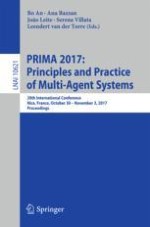2017 | Buch
PRIMA 2017: Principles and Practice of Multi-Agent Systems
20th International Conference, Nice, France, October 30 – November 3, 2017, Proceedings
herausgegeben von: Bo An, Ana Bazzan, João Leite, Serena Villata, Leendert van der Torre
Verlag: Springer International Publishing
Buchreihe : Lecture Notes in Computer Science
